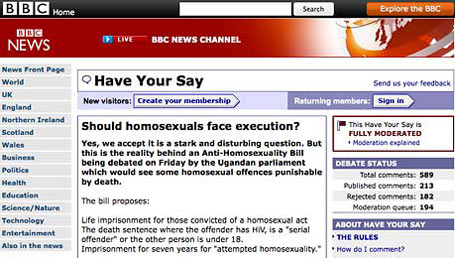The British Broadcasting Corporation asked on its website "Should homosexuals face execution?" ahead of an interactive programme related to a bill proposed by the Ugandan parliament which would make "aggravated homosexuality" punishable by death.
It asked readers for their views on the subject to be discussed on its World Service programme Africa Have Your Say.

The poll drew over 600 comments (although only 200 were published on the website) while it circulated on Twitter and blogs before it was renamed "Should Uganda debate gay execution? The debate is now closed.
While some posters supported the proposed bill (that gay men and women should be killed) as "Uganda (and by extension Africa) has a unique tradition which needs to be protected by the influences of Western culture which seem to corrupt the morals of our generation (Abednego Otchere, Kumasi, Ghana)," some were appalled that the BBC has put up the question for debate.The poll drew over 600 comments (although only 200 were published on the website) while it circulated on Twitter and blogs before it was renamed "Should Uganda debate gay execution?" The debate is now closed.
One wrote: "I feel like I have just stepped in to a demonic parallel universe. Should homosexuals be executed? And people are actually debating it!"
"Utterly disgusting way for the BBC to start a discussion. There are no two sides to this 'debate'. The idea in the title is so completely abhorrent and unacceptable that there can be no point in asking the question." Wrote ManchePaul in response to a news story on guardian.co.uk about the BBC poll.
The discussion even prompted politicians to comment with Eric Joyce, the Labour member for Falkirk, telling his colleagues at the British House of Commons: "We should be looking at what is going on in Uganda with abhorrence. We should be condemning it, and the BBC should be condemning it, just as we do sexual violence in the Congo or genocide in Rwanda or Darfur."
He had earlier encouraged people to tweet on the subject "and make the BBC take this disgrace down". He was quoted by The Times Online as saying: "Is the BBC really there to provide credibility to a vile discussion around a profoundly hideous and savage piece of legislation? No, of course not."
Opposition Liberal Democrats member Lynne Featherstone had reportedly written to BBC executives seeking an apology and an end to the Web discussion.
She said, "Suggesting that the state-sponsored murder of gay people is OK as a legitimate topic for debate is deeply offensive."
The BBC's World Service Africa program editor, David Stead, defended the debate. In a blog posted on the BBC Web site, he said editors had "thought long and hard about using this question" and sought to reflect the diverse views about homosexuality in Africa.
"We agree that it is a stark and challenging question, but think that it accurately focuses on and illustrates the real issue at stake," he said.
"This issue has already sparked much debate around the world and understandably led to us receiving many emails and texts. We have sought to moderate these rigorously while at the same time trying to reflect the varied and hugely diverse views about homosexuality in Africa."

